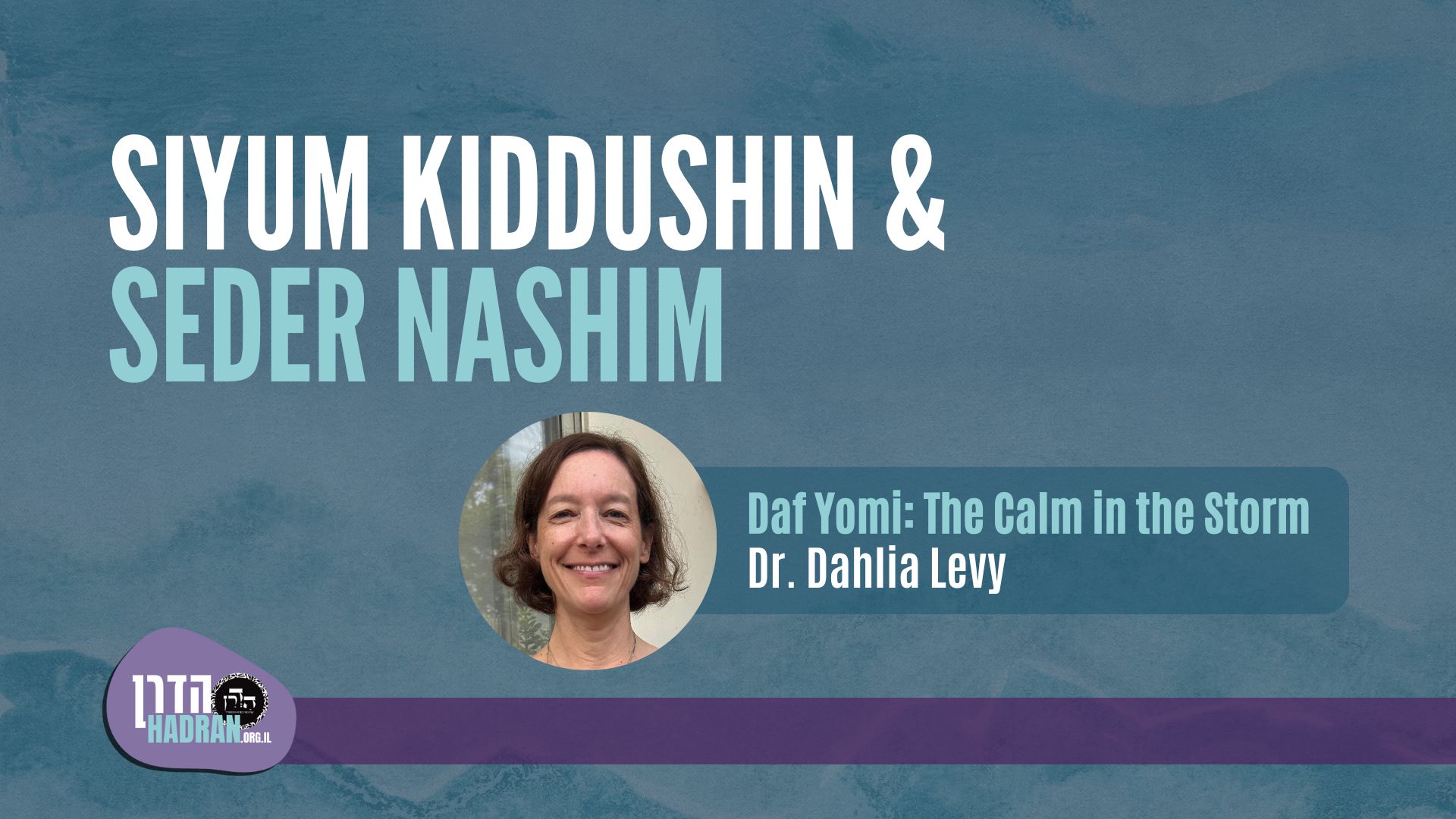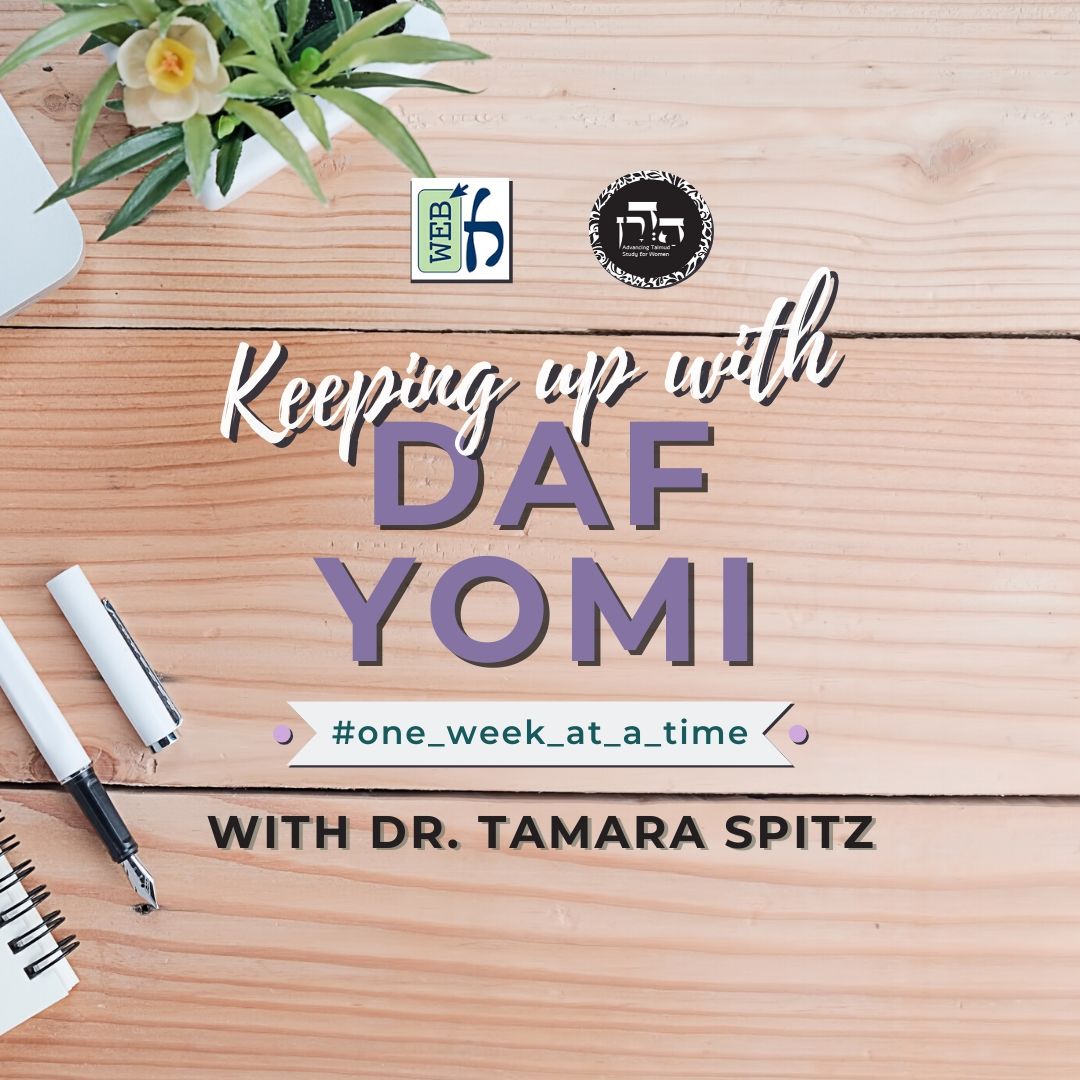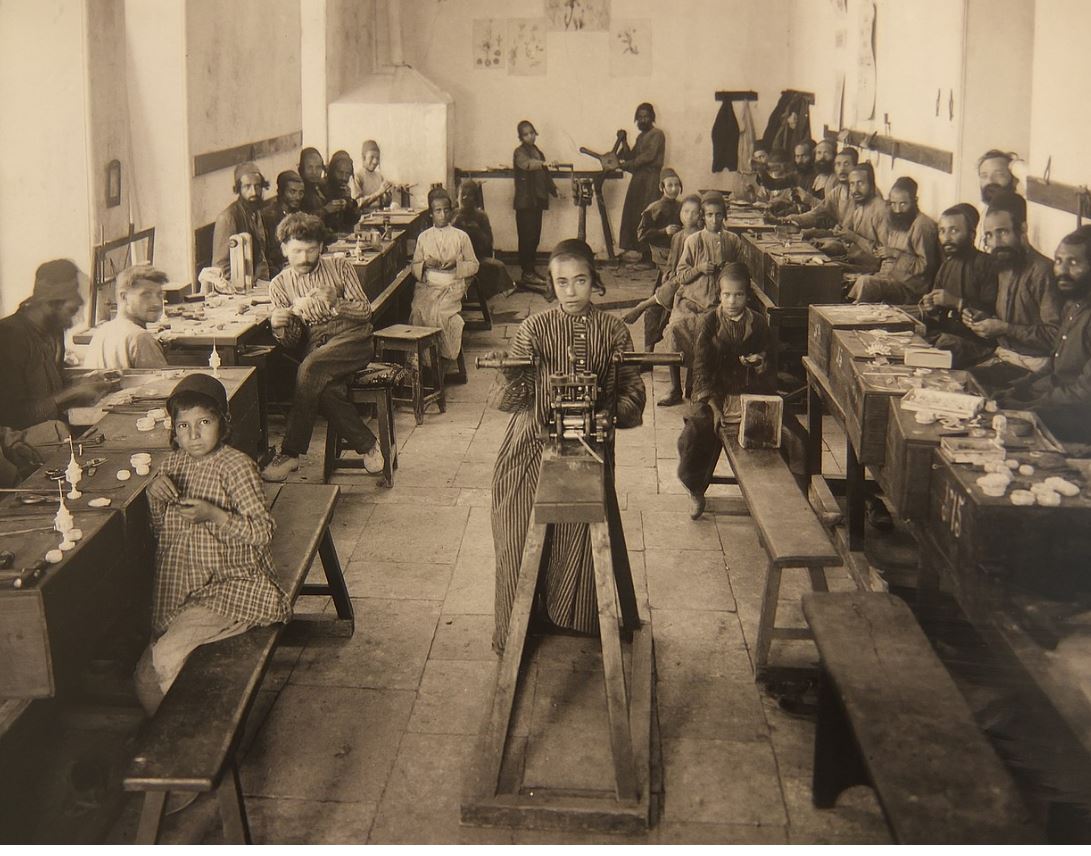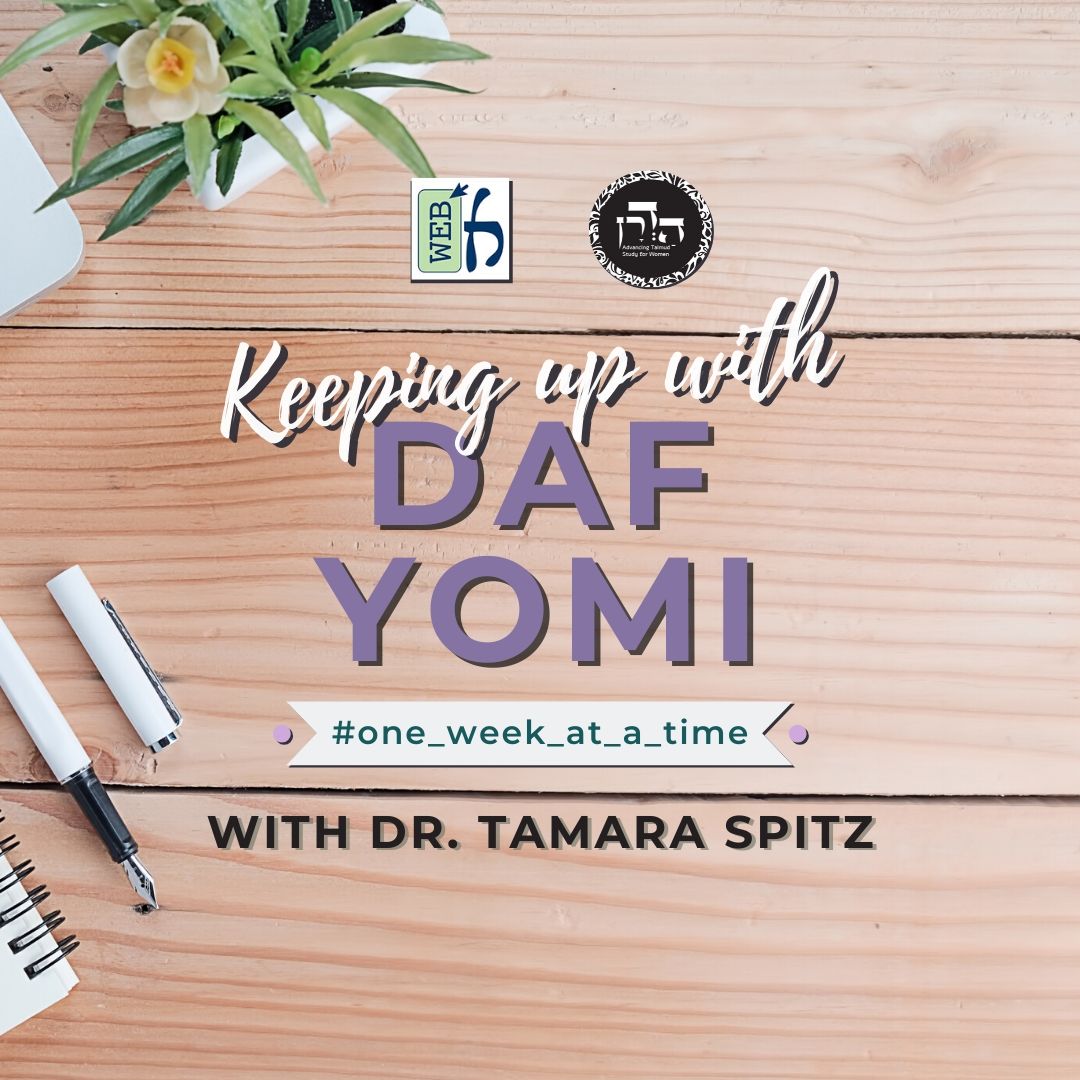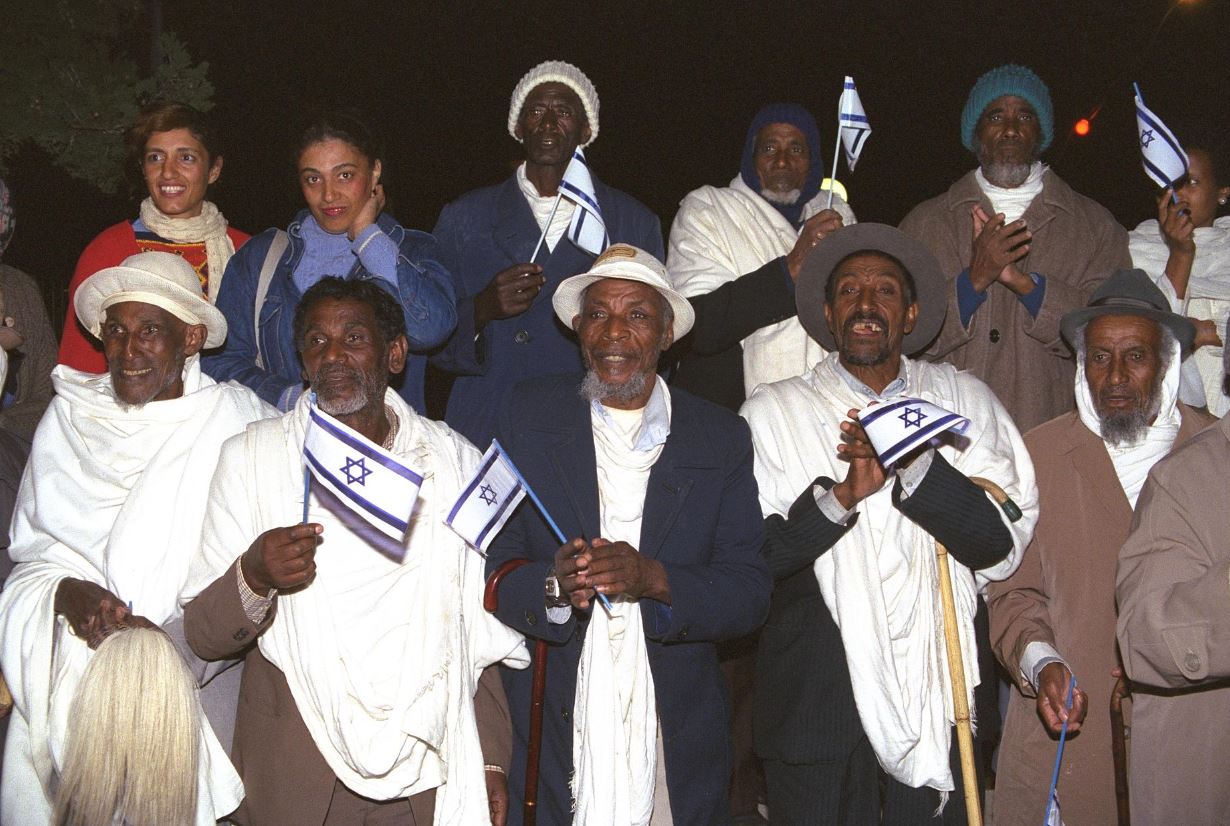Kiddushin 17
יָכוֹל אֲפִילּוּ חָלָה? – תַּלְמוּד לוֹמַר: ״וּבַשְּׁבִעִת יֵצֵא״?
One might have thought that even a slave who became sick and is unable to work must work additional time to compensate for the time missed. Therefore, the verse states: “And in the seventh he shall go out” (Exodus 21:2), which indicates that he leaves his master in any case, even if he has not worked the full six years.
אָמַר רַב שֵׁשֶׁת: הָכָא בְּמַאי עָסְקִינַן, כְּגוֹן שֶׁבָּרַח וּפָגַע בּוֹ יוֹבֵל. מַהוּ דְּתֵימָא: הוֹאִיל וְאַפֵּיק לֵיהּ יוֹבֵל, ״שִׁילּוּחוֹ מֵעִמָּךְ״ קָרֵינַן בֵּיהּ, וְלָא נִיקְנְסֵיהּ, וְנַעֲנֵיק לֵיהּ, קָא מַשְׁמַע לַן.
Rav Sheshet said: With what are we dealing here? This concerns a case where he fled and the Jubilee Year arrived immediately afterward, and therefore he did not complete the six years of servitude. The novelty of this halakha is as follows. Lest you say: Since the Jubilee Year released him, he is considered sent away by you, the master, and therefore we should not penalize him but grant him the severance gift, the baraita teaches us that once he flees he forfeits his right to the severance gift.
אָמַר מָר: יָכוֹל אֲפִילּוּ חָלָה – תַּלְמוּד לוֹמַר: ״וּבַשְּׁבִעִת יֵצֵא״. אֲפִילּוּ חָלָה כׇּל שֵׁשׁ? וְהָתַנְיָא: חָלָה שָׁלֹשׁ וְעָבַד שָׁלֹשׁ – אֵינוֹ חַיָּיב לְהַשְׁלִים, חָלָה כׇּל שֵׁשׁ – חַיָּיב לְהַשְׁלִים! אָמַר רַב שֵׁשֶׁת: בְּעוֹשֶׂה מַעֲשֵׂה מַחַט.
The Master said above: One might have thought that even a slave who became sick and was unable to work must work additional time to compensate for the time missed. Therefore, the verse states: “And in the seventh he shall go out” (Exodus 21:2). The Gemara asks: Is he excused from working additional time even if he was sick for all six years? But isn’t it taught in a baraita: If he was sick for three years and served for three years, he is not obligated to complete the six years of actual labor, but if he was sick for all six years he is obligated to complete the six years of actual labor. Rav Sheshet said: This is referring to a case where he is unable to perform strenuous labor but can execute minor tasks, such as performing needlework or sewing clothes. Since he can perform work of some kind, this slave is not required to work additional time to compensate for the time missed, even if he was ill for all six years.
הָא גוּפָא קַשְׁיָא – אָמְרַתְּ: חָלָה שָׁלֹשׁ וְעָבַד שָׁלֹשׁ – אֵין חַיָּיב לְהַשְׁלִים. הָא אַרְבַּע – חַיָּיב לְהַשְׁלִים. אֵימָא סֵיפָא: חָלָה כׇּל שֵׁשׁ – חַיָּיב לְהַשְׁלִים. הָא אַרְבַּע – אֵין חַיָּיב לְהַשְׁלִים! הָכִי קָאָמַר: חָלָה אַרְבַּע, נַעֲשָׂה כְּמִי שֶׁחָלָה כׇּל שֵׁשׁ וְחַיָּיב לְהַשְׁלִים.
The Gemara comments: This matter itself is difficult, as the baraita is apparently self-contradictory. On the one hand, you said that if he was sick for three years and he served for the other three years he is not obligated to complete the six years of actual labor. This indicates that if he was ill for four years he is obligated to complete the six years of labor. On the other hand, say the last clause of the baraita: If he was sick for all six years he is obligated to complete the six years of actual labor. That indicates that if he was ill for four years he is not obligated to complete the six years of actual labor. The Gemara answers that this is what the baraita is saying: If he was sick for four years he becomes as one who was sick for all six years, and therefore he is required to complete the six years of actual labor.
תָּנוּ רַבָּנַן: כַּמָּה מַעֲנִיקִים לוֹ? חָמֵשׁ סְלָעִים מִכׇּל מִין וָמִין, שֶׁהֵן חֲמֵשׁ עֶשְׂרֵה סְלָעִים, דִּבְרֵי רַבִּי מֵאִיר. רַבִּי יְהוּדָה אוֹמֵר: שְׁלֹשִׁים, כִּשְׁלֹשִׁים שֶׁל עֶבֶד. רַבִּי שִׁמְעוֹן אוֹמֵר: חֲמִשִּׁים, כַּחֲמִשִּׁים שֶׁבָּעֲרָכִין.
§ The Sages taught: How much does one grant a freed slave as a severance gift? It is five sela in value of each and every type mentioned in this verse: “And you shall grant severance to him out of your flock, and out of your threshing floor, and out of your winepress” (Deuteronomy 15:14), which is a total of fifteen sela. This is the statement of Rabbi Meir. Rabbi Yehuda says: He is given thirty sela in total, like the thirty shekels of the fine that is paid for a slave (see Exodus 21:32). Rabbi Shimon says: The master gives him fifty shekels, like the sum of valuations, in which fifty shekels is the largest designated amount for a man (see Leviticus 27:3).
אָמַר מָר: חָמֵשׁ סְלָעִים מִכׇּל מִין וָמִין, שֶׁהֵם חֲמֵשׁ עֶשְׂרֵה סְלָעִים, דִּבְרֵי רַבִּי מֵאִיר. וְרַבִּי מֵאִיר, מִנְיָנָא אֲתָא לְאַשְׁמוֹעִינַן? הָא קָא מַשְׁמַע לַן: מִיבְצָר הוּא דְּלָא (מְבַצַּר) [לִיבְצַר] לֵיהּ מֵהַאי מִנְיָנָא, וְאִי בָּצַר לֵיהּ מֵחַד מִינָא וְטָפֵי לֵיהּ מֵחַד מִינָא – לֵית לַן בַּהּ.
The Master said above: The master gives five sela of each and every type, which is fifteen sela; this is the statement of Rabbi Meir. The Gemara asks: And does Rabbi Meir come to teach us to count? His novelty certainly cannot be that three fives equal fifteen. The Gemara answers that Rabbi Meir teaches us this: The master may not give less than this total number, but if he gives him less of one type and more of one other type, we have no problem with it, and he has fulfilled the mitzva.
מַאי טַעְמָא דְּרַבִּי מֵאִיר? יָלֵיף ״רֵיקָם״ ״רֵיקָם״ מִבְּכוֹר. מָה לְהַלָּן חָמֵשׁ סְלָעִים – אַף כָּאן חָמֵשׁ סְלָעִים.
The Gemara asks: What is the reasoning of Rabbi Meir? The Gemara explains: He derives a verbal analogy from “empty” stated with regard to the severance gift: “You shall not send him away empty” (Deuteronomy 15:13), and “empty” stated with regard to a firstborn: “All the firstborn of your sons you shall redeem; and none shall appear before Me empty” (Exodus 34:20). Just as there, in the case of the firstborn, one must give five sela, so too here, in the case of severance gifts, one must give five sela.
וְאֵימָא, חָמֵשׁ סְלָעִים מִכּוּלְּהוּ! אִי כְּתִיב ״רֵיקָם״ לְבַסּוֹף, כִּדְקָאָמְרַתְּ. הַשְׁתָּא דִּכְתִיב ״רֵיקָם״ בְּרֵישָׁא, שְׁדִי ״רֵיקָם״ אַ״צֹּאן״, ״רֵיקָם״ אַ״גּוֹרֶן״, ״רֵיקָם״ אַ״יֶּקֶב״.
The Gemara asks: But one can say that he is obligated to give only five sela in total from all of the three types listed in the verse. The Gemara answers: If “empty” were written at the end of the verse, i.e., Deuteronomy 15:14, the halakha would be as you said. But now that “empty” is written before the verse, i.e., at the end of Deuteronomy 15:13, apply the phrase “Do not send him away empty” to “flock,” and apply “empty” to “threshing floor,” and likewise apply “empty” to “winepress.” Consequently, there must be five sela for each type.
וְנֵילַף ״רֵיקָם״ ״רֵיקָם״ מֵעוֹלַת רְאִיָּה! אָמַר קְרָא: ״אֲשֶׁר בֵּרַכְךָ ה׳ אֱלֹהֶיךָ״.
The Gemara asks: And let us derive a verbal analogy between “empty” and “empty” from the case of the burnt-offering of appearance in the Temple brought on the pilgrimage Festivals, with regard to which it is said: “And they shall not appear before the Lord empty” (Deuteronomy 16:16). The burnt-offering of appearance has no fixed value. The Gemara answers that the verse states: “Of that with which the Lord your God has blessed you” (Deuteronomy 15:14), which indicates that one must give a respectable amount as a severance gift.
רַבִּי יְהוּדָה אוֹמֵר: שְׁלֹשִׁים כִּשְׁלֹשִׁים שֶׁל עֶבֶד. מַאי טַעְמָא דְּרַבִּי יְהוּדָה? יָלֵיף ״נְתִינָה״ ״נְתִינָה״ מֵעֶבֶד. מָה לְהַלָּן שְׁלֹשִׁים – אַף כָּאן שְׁלֹשִׁים.
The baraita states that Rabbi Yehuda says that a freed slave is given thirty sela in total, like the thirty shekels of the fine that is paid for a slave. The Gemara asks: What is the reasoning of Rabbi Yehuda? The Gemara answers: He derives a verbal analogy between giving, as stated with regard to the severance gift, from the expression of giving stated in connection to a Canaanite slave gored by an ox: “He shall give to their master thirty shekels of silver” (Exodus 21:32). Just as there, he must pay thirty shekels for the slave, so too here, in the case of a severance gift, he must pay thirty.
וְנֵילַף ״נְתִינָה״ ״נְתִינָה״ מֵעֲרָכִין, מָה לְהַלָּן חֲמִשִּׁים – אַף כָּאן חֲמִשִּׁים!
The Gemara asks: But let him derive a similar verbal analogy between “giving” stated with regard to the severance gift and “giving” from valuations (see Leviticus 27:23): Just as there, in the case of valuations, it is fifty shekels for an adult male, so too here, it should be fifty.
חֲדָא, דְּתָפַשְׂתָּה מְרוּבֶּה לֹא תָּפַשְׂתָּה, תָּפַשְׂתָּה מוּעָט תָּפַשְׂתָּה. וְעוֹד, עֶבֶד מֵעֶבֶד הֲוָה לֵיהּ לְמֵילַף.
The Gemara responds: One answer is, as people say, that if you grasped too much, you did not grasp anything; if you grasped a bit, you grasped something. In other words, if there are two possible sources from which to derive the sum of the severance gift, then without conclusive proof one may not presume that the Torah intended to teach the larger amount. Consequently, the master should be required to give only thirty shekels, not fifty. And furthermore, one should derive the halakha of a slave, i.e., the severance gift, from another case involving a slave, i.e., the thirty shekels paid when a Canaanite slave is gored by an ox, rather than derive the halakha of the severance gift from valuations, which apply to all people.
רַבִּי שִׁמְעוֹן אוֹמֵר: חֲמִשִּׁים כַּחֲמִשִּׁים שֶׁבָּעֲרָכִין. מַאי טַעְמֵיהּ דְּרַבִּי שִׁמְעוֹן? גָּמַר ״נְתִינָה״ ״נְתִינָה״ מֵעֲרָכִין, מָה לְהַלָּן חֲמִשִּׁים – אַף כָּאן חֲמִשִּׁים. וְאֵימָא: כַּפָּחוּת שֶׁבָּעֲרָכִין! ״אֲשֶׁר בֵּרַכְךָ ה׳ אֱלֹהֶיךָ״ כְּתִיב.
The baraita further teaches that Rabbi Shimon says: The master gives him fifty shekels, like the fifty shekels of valuations for an adult male. The Gemara asks: What is the reasoning of Rabbi Shimon? He derived a verbal analogy between “giving” and “giving” from valuations (Leviticus 27:23): Just as there, he pays fifty, so too here, he pays fifty. The Gemara asks: But one can say that as this verbal analogy is referring to valuations in general, he should pay the smallest of the valuations, which is merely three sela. The Gemara answers that it is written: “Of that with which the Lord your God has blessed you” (Deuteronomy 15:14), which indicates that one must give a respectable amount as a severance gift.
וְנֵילַף ״נְתִינָה״ ״נְתִינָה״ מֵעֶבֶד, מָה לְהַלָּן שְׁלֹשִׁים – אַף כָּאן שְׁלֹשִׁים; חֲדָא, דְּתָפַשְׂתָּה מְרוּבֶּה לֹא תָּפַשְׂתָּה, וְעוֹד, עֶבֶד מֵעֶבֶד הֲוָה לֵיהּ לְמֵילַף! רַבִּי שִׁמְעוֹן ״מִיכָה״ ״מִיכָה״ גָּמַר.
The Gemara asks: But let Rabbi Shimon derive, like Rabbi Yehuda, the verbal analogy between “giving” and “giving” from the verses discussing the goring of a Canaanite slave, teaching that just as there he pays thirty, so too here, he pays thirty? The Gemara adds that there are two reasons to prefer this derivation, as stated above: One reason is that if you grasped too much, you did not grasp anything; if you grasped a bit, you grasped something. And furthermore, one should derive the halakha of a slave from another case involving a slave. The Gemara answers: Rabbi Shimon derives a verbal analogy between poverty and poverty. With regard to valuations the Torah states: “But if he is too poor” (Leviticus 27:8), and concerning a Hebrew slave the verse says: “And if your brother grows poor” (Leviticus 25:39).
בִּשְׁלָמָא לְרַבִּי מֵאִיר, הַיְינוּ דִּכְתִיב צֹאן גּוֹרֶן וָיֶקֶב. אֶלָּא לְרַבִּי יְהוּדָה וְרַבִּי שִׁמְעוֹן הַאי צֹאן גּוֹרֶן וָיֶקֶב לְמָה לִי?
Having ascertained the source for each of the opinions in the baraita, the Gemara analyzes their opinions. The Gemara asks: Granted, with regard to the opinion of Rabbi Meir, this is as it is written “flock,” “threshing floor,” and “winepress,” as he derives from these three terms that the severance gift must be worth fifteen sela. But according to the opinions of Rabbi Yehuda and Rabbi Shimon, why do I need these terms “flock,” “threshing floor,” and “winepress,” in light of the fact that one may give his slave any product?
הַאי מִיבְּעֵי לֵיהּ לְכִדְתַנְיָא: יָכוֹל לֹא יְהוּ מַעֲנִיקִין אֶלָּא מִצֹּאן גּוֹרֶן וָיֶקֶב, מִנַּיִן לְרַבּוֹת כׇּל דָּבָר – תַּלְמוּד לוֹמַר: ״אֲשֶׁר בֵּרַכְךָ ה׳ אֱלֹהֶיךָ״. אִם כֵּן מָה תַּלְמוּד לוֹמַר צֹאן גּוֹרֶן וָיֶקֶב? לוֹמַר לָךְ: מָה צֹאן גּוֹרֶן וָיֶקֶב מְיוּחָדִים, שֶׁיֶּשְׁנָן בִּכְלַל בְּרָכָה – אַף כֹּל שֶׁיֶּשְׁנָן בִּכְלַל בְּרָכָה, יָצְאוּ כְּסָפִים, דִּבְרֵי רַבִּי שִׁמְעוֹן. רַבִּי אֱלִיעֶזֶר בֶּן יַעֲקֹב אוֹמֵר: יָצְאוּ פְּרָדוֹת.
The Gemara answers: These terms are necessary for that which is taught in a baraita: One might have thought that one grants severance gifts only from the flock, the threshing floor, and the winepress; from where is it derived to include every matter? The verse states: “Of that with which the Lord your God has blessed you” (Deuteronomy 15:14). If so, what is the meaning when the verse states “flock,” “threshing floor,” and “winepress”? This serves to tell you that just as a flock, a threshing floor, and a winepress are unique in that they are included in the category of blessing, i.e., they grow and multiply, so too all items that are included in the category of blessing may be given as a severance gift. This excludes money, which does not increase on its own. This is the statement of Rabbi Shimon. Rabbi Eliezer ben Ya’akov says: This excludes mules, which cannot reproduce.
וְרַבִּי שִׁמְעוֹן? פְּרָדוֹת מַשְׁבְּחָן בְּגוּפַיְיהוּ. וְרַבִּי אֱלִיעֶזֶר בֶּן יַעֲקֹב? כְּסָפִים עָבֵיד בְּהוּ עִיסְקָא.
The Gemara asks: And Rabbi Shimon, why does he exclude money but not mules? The Gemara answers: With regard to mules, their bodies grow and enhance. Although they do not reproduce, they still grow. And Rabbi Eliezer ben Ya’akov, why doesn’t he exclude money? He maintains that one can conduct business with money and thereby profit from it. In this manner money can increase.
וּצְרִיכָא, דְּאִי כְּתַב רַחֲמָנָא צֹאן, הֲוָה אָמֵינָא בַּעֲלֵי חַיִּים – אִין, גִּידּוּלֵי קַרְקַע – לָא, כְּתַב רַחֲמָנָא גּוֹרֶן. וְאִי כְּתַב גּוֹרֶן, הֲוָה אָמֵינָא: גִּידּוּלֵי קַרְקַע – אִין, בַּעֲלֵי חַיִּים – לָא, כְּתַב רַחֲמָנָא צֹאן. יֶקֶב לְמָה לִי?
The Gemara notes: And it is necessary for the Torah to mention a flock, a threshing floor, and a winepress, as, if the Merciful One had written only “flock,” I would say that animals, yes, the master may give them to his slave upon his release, but that which grows from the ground, no, he may not give them. Therefore, the Merciful One writes “threshing floor.” And if the Torah had written only “threshing floor,” I would say that that which grows from the ground, yes, he may give them, but animals, no, he may not give them. Therefore, the Merciful One writes “flock.” The Gemara asks: Since threshing floor is stated, why do I need the mention of a winepress?
לְמָר – לְמַעוֹטֵי כְּסָפִים, לְמָר – לְמַעוֹטֵי פְּרָדוֹת.
The Gemara answers: According to one Master, Rabbi Shimon, this term serves to exclude money. According to the other Master, Rabbi Eliezer, it serves to exclude mules.
תָּנוּ רַבָּנַן: ״אֲשֶׁר בֵּרַכְךָ ה׳ אֱלֹהֶיךָ״, יָכוֹל נִתְבָּרֵךְ בַּיִת בִּגְלָלוֹ – מַעֲנִיקִים לוֹ, לֹא נִתְבָּרֵךְ בַּיִת בִּגְלָלוֹ – אֵין מַעֲנִיקִים לוֹ, תַּלְמוּד לוֹמַר: ״הַעֲנֵק תַּעֲנִיק״ – מִכׇּל מָקוֹם. אִם כֵּן, מָה תַּלְמוּד לוֹמַר ״אֲשֶׁר בֵּרַכְךָ״ – הַכֹּל לְפִי בְּרָכָה תֵּן לוֹ.
The Sages taught with regard to the verse: “And you shall grant severance to him out of your flock, and out of your threshing floor, and out of your winepress, of that with which the Lord your God has blessed you” (Deuteronomy 15:14). One might have thought that if the house is blessed due to him, then the master grants him a severance gift, and if the house is not blessed due to him, he does not grant him a severance gift. Therefore, the verse states: “You shall grant severance [ha’anek ta’anik],” with the doubled form of the verb used for emphasis, to indicate that you must grant him a severance gift in any case. If so, what is the meaning when the verse states: “Of that with which the Lord your God has blessed you”? This teaches that all that one gives him as a severance gift should be in accordance with the blessing one possesses.
רַבִּי אֶלְעָזָר בֶּן עֲזַרְיָה אוֹמֵר: דְּבָרִים כִּכְתָבָן. נִתְבָּרֵךְ בַּיִת בִּגְלָלוֹ – מַעֲנִיקִים לוֹ, לֹא נִתְבָּרֵךְ בַּיִת בִּגְלָלוֹ – אֵין מַעֲנִיקִים לוֹ. אִם כֵּן מָה תַּלְמוּד לוֹמַר: ״הַעֲנֵיק תַּעֲנִיק״? דִּבְּרָה תוֹרָה כִלְשׁוֹן בְּנֵי אָדָם.
Rabbi Elazar ben Azarya says: The meaning of the statements of the Torah is as they are written, i.e., as indicated by a straightforward reading of the verse. Therefore, if the house was blessed due to him, the master grants him a severance gift, and if the house was not blessed due to him, he does not grant him a severance gift at all. If so, what is the meaning when the verse states: “You shall grant severance [ha’anek ta’anik],” with the doubled form of the verb? The Torah spoke in the language of people, i.e., the emphasis of the doubled verb is merely stylistic, but does not serve to teach a novel halakha.
תָּנוּ רַבָּנַן: עֶבֶד עִבְרִי עוֹבֵד אֶת הַבֵּן, וְאֵינוֹ עוֹבֵד אֶת הַבַּת. אָמָה עִבְרִיָּה אֵינָהּ עוֹבֶדֶת לֹא אֶת הַבֵּן וְלֹא אֶת הַבַּת. הַנִּרְצָע וְהַנִּמְכָּר לְנׇכְרִי אֵינוֹ עוֹבֵד לֹא אֶת הַבֵּן וְלֹא אֶת הַבַּת. אָמַר מָר: עֶבֶד עִבְרִי עוֹבֵד אֶת הַבֵּן, וְאֵינוֹ עוֹבֵד אֶת הַבַּת. מְנָהָנֵי מִילֵּי?
§ The Sages taught: A Hebrew slave serves the son of his deceased master but does not serve the daughter. A Hebrew maidservant serves neither the son nor the daughter, but only the master. A pierced slave and a Hebrew slave sold to a gentile serve neither the son nor the daughter. The Master said above: A Hebrew slave serves the son but does not serve the daughter. The Gemara asks: From where is this matter derived?
דְּתָנוּ רַבָּנַן: ״וַעֲבָדְךָ שֵׁשׁ שָׁנִים״ – לְךָ וְלֹא לַיּוֹרֵשׁ. אַתָּה אוֹמֵר: לְךָ וְלֹא לַיּוֹרֵשׁ, אוֹ אֵינוֹ אֶלָּא: לְךָ וְלֹא לַבֵּן? כְּשֶׁהוּא אוֹמֵר: שֵׁשׁ שָׁנִים יַעֲבֹד״, הֲרֵי לַבֵּן אָמוּר, הָא מָה אֲנִי מְקַיֵּים: ״וַעֲבָדְךָ שֵׁשׁ שָׁנִים״ לְךָ – וְלֹא לַיּוֹרֵשׁ.
As the Sages taught, with regard to a verse that deals with a Hebrew slave: “And he shall serve you six years” (Deuteronomy 15:12). This indicates that he serves you and not an heir, i.e., if the master dies his slave does not serve one who inherits his estate. Do you say: You and not an heir, or perhaps is it even: You and not a son? The Gemara answers: When it says: “Six years he shall labor” (Exodus 21:2), which does not indicate any exclusion, the inclusion of a son is thereby stated. How then do I uphold the other verse: “And he shall serve you six years”? The expression “serve you” emphasizes that he serves only you but he does not serve an heir other than a son.
מָה רָאִיתָ לְרַבּוֹת אֶת הַבֵּן, וּלְהוֹצִיא אֶת הָאָח? מְרַבֶּה אֲנִי אֶת הַבֵּן – שֶׁכֵּן קָם תַּחַת אָבִיו לִיעִדָה וְלִשְׂדֵה אֲחוּזָּה.
The Gemara asks: What did you see that led you to include the son who inherits a Hebrew slave and to exclude the brother from inheriting his brother’s slave? The Gemara answers: I include the son, as he stands in place of his father to designate her. Just as a father can designate a Hebrew maidservant as a wife for himself, so too can he betroth her on behalf of his son. And similarly, he replaces his father with regard to an ancestral field (see Leviticus 27:16–21). If one redeems a field consecrated by his father, it is considered as though the father himself had redeemed it, which means that the field returns to the family in the Jubilee Year. If someone else redeems the field, including a brother, it does not return to the family.
אַדְּרַבָּה, מְרַבֶּה אֲנִי אֶת הָאָח שֶׁכֵּן קָם תַּחַת אָחִיו לְיִבּוּם! כְּלוּם יֵשׁ יִבּוּם אֶלָּא בְּמָקוֹם שֶׁאֵין בֵּן? הָא יֵשׁ בֵּן – אֵין יִבּוּם.
The Gemara asks: On the contrary, I should include the brother, as he stands in his brother’s place with regard to levirate marriage. The Gemara responds: This is insufficient proof, as is there levirate marriage other than in a case when there is no son? If there is a son, there is no levirate marriage. This indicates that a son replaces the deceased before a brother, even with regard to levirate marriage.
אֶלָּא טַעְמָא דְּאִיכָּא הָא פִּירְכָא, הָא לָאו הָכִי אָח עֲדִיף? וְתִיפּוֹק לִי דְּהָכָא תַּרְתֵּי, וְהָכָא חֲדָא!
The Gemara asks: Rather, the reason for this halakha is specifically that there is this refutation that a levirate marriage applies only when there is no son. Does that not indicate that without this consideration I would say that a brother is preferable to a son? But let me derive that a son has a greater claim of standing in place of his father than a brother from the fact that here, with regard to the preference of a son, there are two cases: Designation of a Hebrew maidservant and an ancestral field, and here, in the case of a brother, there is only one: Levirate marriage.
שְׂדֵה אֲחוּזָּה נָמֵי, מֵהַאי פִּירְכָא הוּא דְּקָא נָפְקָא לֵיהּ לְתַנָּא: כְּלוּם יֵשׁ יִבּוּם אֶלָּא בְּמָקוֹם שֶׁאֵין בֵּן?
The Gemara answers: With regard to an ancestral field too, the tanna derives the halakha from this same refutation. The tanna learns from the case of levirate marriage that only the son, not the brother, takes the place of his father for the redemption of the field, employing the same reasoning mentioned above: Is there levirate marriage other than in a case when there is no son? Therefore, without this consideration there is only one supporting example for each claim.
אָמָה הָעִבְרִיָּה אֵינָהּ עוֹבֶדֶת לֹא אֶת הַבֵּן וְלֹא אֶת הַבַּת. מְנָהָנֵי מִילֵּי? אָמַר רַבִּי פְּדָא: דְּאָמַר קְרָא ״וְאַף לַאֲמָתְךָ תַּעֲשֶׂה כֵּן״ – הִקִּישָׁהּ הַכָּתוּב לַנִּרְצָע, מָה נִרְצָע אֵינוֹ עוֹבֵד לֹא אֶת הַבֵּן וְלֹא אֶת הַבַּת – אַף אָמָה הָעִבְרִיָּה אֵינָהּ עוֹבֶדֶת לֹא אֶת הַבֵּן וְלֹא אֶת הַבַּת. וְהַאי ״לַאֲמָתְךָ תַּעֲשֶׂה כֵּן״ לְהָכִי הוּא דַּאֲתָא? הָא מִיבְּעֵי לֵיהּ לְכִדְתַנְיָא: ״וְאַף לַאֲמָתְךָ תַּעֲשֶׂה כֵּן״ – לְהֶעֱנֵיק.
§ The baraita taught that a Hebrew maidservant serves neither the brother nor the daughter. The Gemara asks: From where is this matter derived? Rabbi Padda said: As the verse states with regard to a pierced Hebrew slave: “And also to your maidservant you shall do likewise” (Deuteronomy 15:17). The verse juxtaposes a Hebrew maidservant to a pierced slave: Just as a pierced slave serves neither the son nor the daughter, so too a Hebrew maidservant serves neither the son nor the daughter. The Gemara asks: And does this verse: “And also to your maidservant you shall do likewise,” come to teach this matter? The tanna requires it for that which is taught in a baraita, that the verse: “And also to your maidservant you shall do likewise,” is a command to grant her a severance gift.
אַתָּה אוֹמֵר לְהֶעֱנֵיק, אוֹ אֵינוֹ אֶלָּא לִרְצִיעָה? כְּשֶׁהוּא אוֹמֵר ״וְאִם אָמֹר יֹאמַר הָעֶבֶד״ – ״[הָעֶבֶד]״ וְלֹא אָמָה הָעִבְרִיָּה. (הֲרֵי רְצִיעָה אָמוּר),
Do you say that this comparison obligates one to grant a severance gift to a Hebrew maidservant, or is it teaching only that the halakha of piercing a Hebrew slave’s ear with an awl, which is stated immediately beforehand, applies to a Hebrew maidservant as well? The Gemara explains: When it says with regard to piercing: “But if the slave shall say” (Exodus 21:5), which indicates that a Hebrew slave can issue this declaration but a Hebrew maidservant cannot, the halakha of piercing is thereby stated and accounted for.
הָא מָה אֲנִי מְקַיֵּים ״וְאַף לַאֲמָתְךָ תַּעֲשֶׂה כֵּן״ – לְהֶעֱנֵיק! אִם כֵּן נִכְתּוֹב קְרָא: ״לַאֲמָתְךָ כֵּן״, מַאי ״תַּעֲשֶׂה״? שָׁמְעַתְּ מִינַּהּ תַּרְתֵּי.
How do I realize the meaning of the verse: “And also to your maidservant you shall do likewise”? This obligates a master to grant a severance gift to a freed Hebrew maidservant. If so, one cannot derive from this verse that a Hebrew maidservant serves neither the son nor the daughter. The Gemara answers: If so, that it comes only to compare her to a pierced Hebrew slave, let the verse write merely: To your maidservant likewise. What is the meaning of the additional phrase: “You shall do”? Draw two conclusions from this: A Hebrew maidservant does not serve the son, and she is granted severance gifts.
הַנִּרְצָע וְהַנִּמְכָּר לְנׇכְרִי אֵינוֹ עוֹבֵד לֹא אֶת הַבֵּן וְלֹא אֶת הַבַּת. נִרְצָע? דִּכְתִיב: ״וְרָצַע אֲדֹנָיו אֶת אׇזְנוֹ בַּמַּרְצֵעַ וַעֲבָדוֹ לְעֹלָם״ – וְלֹא אֶת הַבֵּן וְאֶת הַבַּת. נִמְכָּר לְנׇכְרִי מִנַּיִן? אָמַר חִזְקִיָּה: אָמַר קְרָא: ״וְחִשַּׁב עִם קֹנֵהוּ״ – וְלֹא עִם יוֹרְשֵׁי קוֹנֵהוּ.
§ The baraita further teaches that a pierced Hebrew slave and one sold to a gentile serve neither the son nor the daughter. The Gemara explains: The halakha of a pierced slave is as it is written: “And his master shall pierce his ear with an awl, and he shall serve him forever” (Exodus 21:6), which indicates that he serves this master, but not the son or the daughter. The Gemara asks: From where is it derived that the same applies to a Hebrew slave sold to a gentile? Ḥizkiyya says that the verse states with regard to the emancipating of a slave who was sold to a gentile: “And he shall reckon with his purchaser” (Leviticus 25:50), which teaches that this applies only to his purchaser but not to the heirs of his purchaser.
אָמַר רָבָא: דְּבַר תּוֹרָה נׇכְרִי יוֹרֵשׁ אֶת אָבִיו, שֶׁנֶּאֱמַר: ״וְחִשַּׁב עִם קֹנֵהוּ״ – וְלֹא עִם יוֹרְשֵׁי קוֹנֵהוּ. מִכְּלָל דְּאִית לֵיהּ יוֹרְשִׁים. גֵּר אֶת הַנׇּכְרִי – אֵינוֹ מִדִּבְרֵי תוֹרָה, אֶלָּא מִדִּבְרֵי סוֹפְרִים.
Rava says: By Torah law a gentile inherits the property of his father, as it is stated with regard to one sold to a gentile: “And he shall reckon with his purchaser,” but not with his purchaser’s heirs. One can derive from here by inference that ordinarily a gentile has heirs. By contrast, by Torah law a convert does not inherit the property of his father or any other gentile, as once he converts he is considered a new person with no ties to his previous family. Rather, a convert inherits the property of his father by rabbinic law.
דִּתְנַן: גֵּר וְנׇכְרִי שֶׁיָּרְשׁוּ אֶת אֲבִיהֶם נׇכְרִי, גֵּר יָכוֹל לוֹמַר לְנׇכְרִי טוֹל אַתָּה עֲבוֹדָה זָרָה וַאֲנִי מָעוֹת, טוֹל אַתָּה יַיִן נֶסֶךְ וַאֲנִי פֵּירוֹת. מִשֶּׁבָּאוּ לִרְשׁוּת גֵּר – אָסוּר.
As we learned in a mishna (Demai 6:10): With regard to a convert and a gentile who inherited property from their gentile father, the convert can say to the gentile: You take the objects of idol worship and I will take money; you take wine used for a libation to idolatry and I will take produce. Provided that these objects have not entered the domain of the convert, he may divide everything with his brother so that his brother takes as an inheritance the items that the convert is prohibited from using as a Jew. But once they have come into the convert’s possession, it is prohibited for him to exchange these objects with his brother, as he would thereby be benefiting from idolatry.
וְאִי סָלְקָא דַּעְתָּךְ דְּאוֹרָיְיתָא, כִּי לֹא בָאוּ לִרְשׁוּתוֹ נָמֵי – כִּי שָׁקֵיל חִילּוּפֵי עֲבוֹדָה זָרָה הוּא דְּקָא שָׁקֵיל!
And if it would enter your mind that a convert inherits property from his father by Torah law, it should be prohibited when these objects have not yet come into his possession as well, as when he takes money or produce and gives the idols to the gentile, he takes an item that has been exchanged for objects of idol worship. Since he receives half the inheritance at the moment when his father dies, he has a share in these items as well.
אֶלָּא: מִדְּרַבָּנַן, גְּזֵירָה הוּא דַּעֲבוּד רַבָּנַן שֶׁמָּא יַחְזוֹר לְסוֹרוֹ. תַּנְיָא נָמֵי הָכִי: בַּמֶּה דְּבָרִים אֲמוּרִים – כְּשֶׁיָּרְשׁוּ, אֲבָל כְּשֶׁנִּשְׁתַּתְּפוּ – אָסוּר.
Rather, a convert inherits property from his father by rabbinic law, as this is a decree that the Sages instituted lest he return to his previous wayward path [suro]. The Sages were concerned that due to his concern over losing his inheritance, a convert might return to his gentile lifestyle. In any event, as he does not inherit his father’s property by Torah law, the idols are not considered his property. This halakha is also taught in a baraita: In what case is this statement said? He may do this when they inherited. But when the convert and the gentile formed a partnership, it is prohibited for him to divide the property so that the gentile takes the idols, as the convert benefits from them indirectly.
נׇכְרִי אֶת הַגֵּר, וְגֵר אֶת הַגֵּר – אֵינוֹ לֹא מִדִּבְרֵי תוֹרָה וְלֹא מִדִּבְרֵי סוֹפְרִים. דִּתְנַן: לָוָה מָעוֹת מִן הַגֵּר שֶׁנִּתְגַּיְּירוּ בָּנָיו עִמּוֹ – לֹא יַחֲזִיר לְבָנָיו. וְאִם הֶחֱזִיר – אֵין רוּחַ חֲכָמִים נוֹחָה הֵימֶנּוּ.
With regard to the same issue it is taught: By Torah law and by rabbinic law a gentile does not inherit property from his father who is a convert, nor does a convert inherit property from his father who is a convert. As we learned in a mishna (Shevi’it 10:9): If one borrowed money from a convert whose sons converted with him, and therefore when they converted there were no longer any legal ties between the sons and the father, he does not return it to the creditor’s sons, as they are not considered his heirs. And if he does return it, the Sages are not pleased with him.
וְהָתַנְיָא רוּחַ חֲכָמִים נוֹחָה הֵימֶנּוּ! לָא קַשְׁיָא, כָּאן שֶׁהוֹרָתוֹ וְלֵידָתוֹ שֶׁלֹּא בִּקְדוּשָּׁה,
The Gemara asks: But isn’t it taught in a baraita that the Sages are pleased with him? The Gemara answers: This is not difficult. Here, it is referring to a convert whose conception and birth were not in sanctity of the Jewish people, i.e., his father was a gentile when he was born and afterward the son converted. In this case there are no legal ties between the father and the son, and therefore one who owes money to the father is not required to pay the son.



